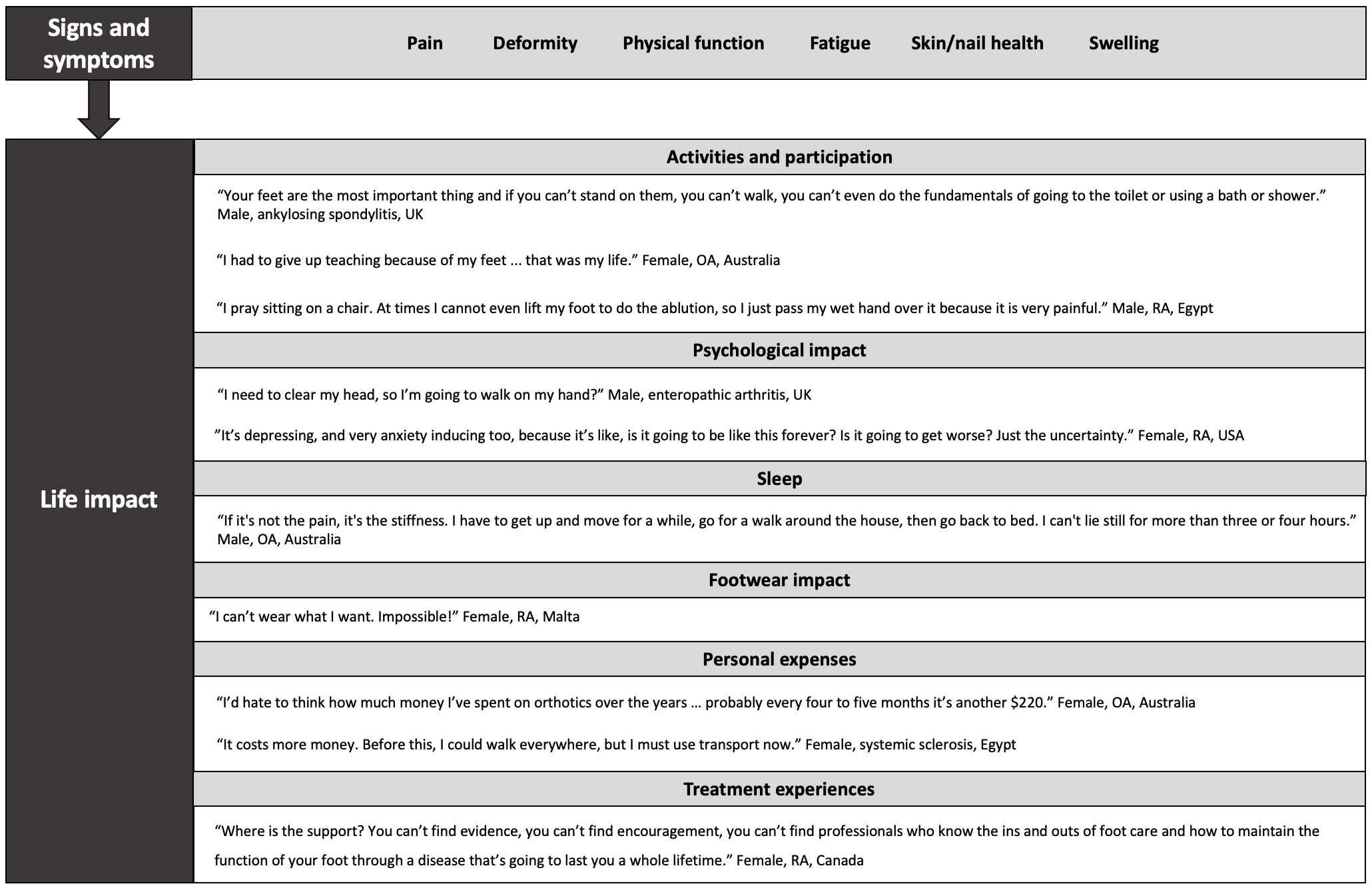Session Information
Session Type: Poster Session C
Session Time: 10:30AM-12:30PM
Background/Purpose: The foot and ankle are frequently affected in rheumatic and musculoskeletal diseases (RMDs), yet there is a lack of high-quality evidence to determine the effectiveness of treatments. Outcomes in foot and ankle research are often inconsistently measured, impeding evidence synthesis. Additionally, clinical decisions are based on research outcomes, but these outcomes are not always regarded as important by patients. The OMERACT Foot and Ankle Working Group is developing a standardised core outcome set to address these issues [1]. This international qualitative study aimed to understand what domains matter to patients with a range of RMDs who had sought treatment for foot and ankle disorders, to inform core outcome set development.
Methods: Patients were recruited through clinical departments and electronic mailing lists, and invited to participate in a single semi-structured interview. Interview transcripts were analysed using a mixed deductive/inductive approach to the framework method. Patient research partners co-produced the interview schedule and recruitment materials, and interpreted results.
Results: Fifty-six patients (37 female; age range 27-76) in eight countries (United Kingdom, Republic of Ireland, Malta, Serbia, Egypt, United States, Canada, Australia) participated. Participants had a variety of RMDs, including rheumatoid arthritis, spondyloarthropathies, juvenile idiopathic arthritis, osteoarthritis, crystal arthropathies, connective tissue diseases and musculoskeletal disorders affecting the foot and ankle in the absence of systemic disease (e.g. plantar heel pain, Achilles tendinopathy). Signs and symptoms of importance to participants included pain, physical function (range of movement, stiffness, muscle weakness, joint instability, balance and altered gait), deformity, fatigue (overall, cognitive and foot/ankle-specific fatigue), skin and nail health, and swelling. These domains impacted on activities and participation (walking, driving, work, household responsibilities, socialising, religious activities, sports, exercise and leisure), psychological health, sleep, footwear and personal expenses (see Image). Similar domains were important to participants regardless of their condition or geographic location. Most participants expressed dissatisfaction and uncertainty relating to treatments. Contextual factors influencing domain priorities, including age, gender, symptom duration and severity, and healthcare system, were also identified.
Conclusion: Foot and ankle disorders have far-reaching consequences for RMD patients, but are often inadequately treated. This large qualitative study provides a foundation for achieving international consensus on outcomes to be measured in all future clinical trials in this area, and identifies contextual factors that should also be taken into consideration when interpreting trial results. Standardising the measurement of outcomes that are meaningful to patients could improve evidence for foot and ankle treatments and facilitate translation of research findings into clinical practice.
To cite this abstract in AMA style:
Chapman L, Flurey C, Redmond A, Richards P, Soliman E, Moshrif A, Malone L, Joyce C, Hannan M, Helliwell P, Hofstetter C, Menz H, Shea B, Siddle H. “I Have Taken Five Different Kinds of Tablets and Injections, and I Still Have Foot Pain”: An International Outcome Measures in Rheumatology (OMERACT) Qualitative Study Exploring Patient Perspectives of Foot and Ankle Disorders [abstract]. Arthritis Rheumatol. 2024; 76 (suppl 9). https://acrabstracts.org/abstract/i-have-taken-five-different-kinds-of-tablets-and-injections-and-i-still-have-foot-pain-an-international-outcome-measures-in-rheumatology-omeract-qualitative-study-exploring-patie/. Accessed .« Back to ACR Convergence 2024
ACR Meeting Abstracts - https://acrabstracts.org/abstract/i-have-taken-five-different-kinds-of-tablets-and-injections-and-i-still-have-foot-pain-an-international-outcome-measures-in-rheumatology-omeract-qualitative-study-exploring-patie/

